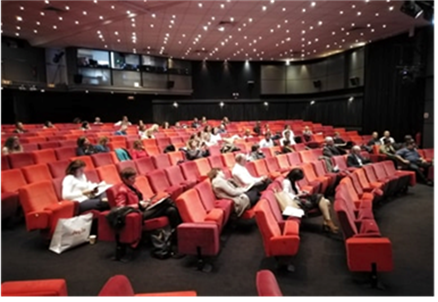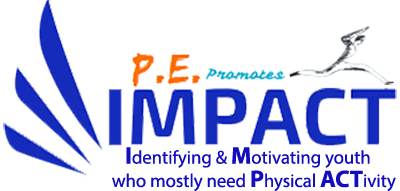Final event: IMPACT Project successful in promotion of youth Physical Activity
Final Official IMPACT Meeting of six leading European Universities, four Educational Institutions and three Physical Education Associations
Athens Greece, 28 - 29 November 2019
The sixth official meeting-workshop and the final event of the ERASMUS+ IMPACT Project took place at Athens (Greece) on 28 to 29 of November 2019. Partners from six collaborative Universities (Universities of Padova, Hacettepe University, University of Grenoble-Alpes, University of Birmingham, Autonomous University of Barcelona, and University of Thessaly), educational institutions of three European countries (Ministry of Education, Research and Religious Affairs from Greece, Institute of Educational Policy from Greece, L’ académie de Grenoble - Rectorat de Grenoble from France, Ankara Milli Egitim Mudurlugu from Turkey) and three European Physical Education Associations (CAPDI-LSM from Italy, European Physical Education Association from Switzerland and Deutscher Sportlehrerverband - DSLV from Germany) participated in this meeting.
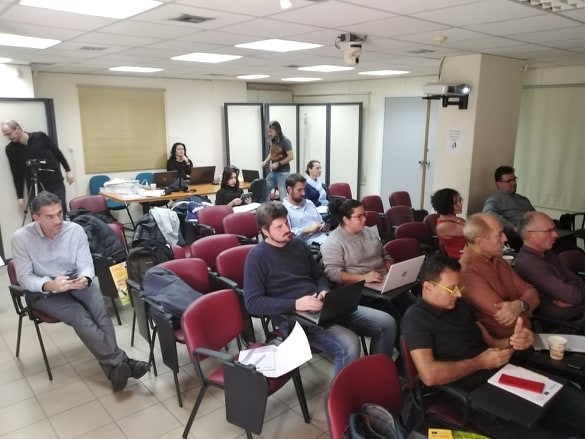
The first day of the official IMPACT meeting the following issues were discussed about:
- The IMPACT educational material & its perception from P.E. teachers and their knowledge development
- The information from visits to schools & discussions with PE teachers in 4 countries
- The partners’ discussion about how to further improve IMPACT educational material/webinars
- The implications & Recommendations for Policy Makers & EC
- The IMPACT website
- The ESTIMATE network
- The IMPACT Dissemination and
- The IMPACT project Evaluation.
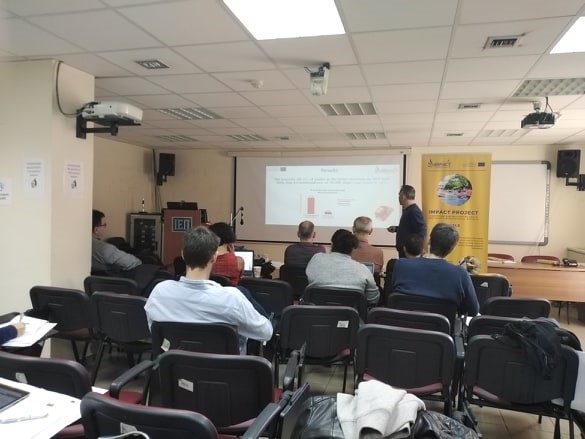
On Friday, 29th of November 2019, the final event of the IMPACT Project was held at the French Institute of Greece (Address: Sina 31A St., Athens), where the core findings and the proposed good practices deriving from the project was presented to an open audience across Europe.
IMPACT Project was implemented over the last three years, from 2017 to 2019 in seven European countries in cooperation with the respective educational institutions of these countries. The main goal of IMPACT Project was to develop a European policy to promote extracurricular physical activity of children and adolescents’ through Physical Education. More than 12000 students, aged 10-18 years, took part across 6 European countries. The results of this project will be used to develop a European roadmap for the diagnosis of inactivity across schools and vulnerable youth in Europe and a network of stakeholders interested in the adoption of concerted actions to promote sport involvement and PA for inactive pupils.
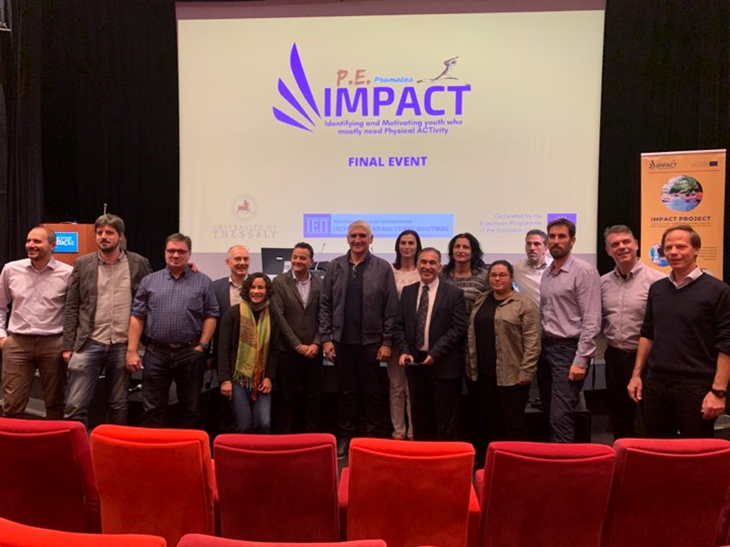
More specifically the main findings of the IMPACT Project were the following:
- Results from the Pilot study supported the reliability, the configural and metric invariance of all measures used across the 6 countries (FR, IT, GR, SP, TR, UK).
- The vast majority of the pupils (85.3%) do not meet World Health Organization’s physical activity recommendations for 60 minutes of moderate to vigorous intensity physical activity daily.
- Large variations in self-report physical activity across schools within the same country.
- Self-report physical activity was positively related with intrinsic motivation, competence, planned behavior variables (intention, perceived behavioral control, and attitudes), action planning, self-monitoring, family and friends support and positive affect.
- Mastery climate was positive related with intrinsic motivation, task orientation, subjective vitality, positive affect, intention to be physically active and self-report physical activity levels.
- Mastery Climate and intrinsic motivation seems to be significant predictors of motivational and well-being variables.
- Basic need satisfaction is clearly related with intention to do PA, motivation for PE and well-being.
- Competence mainly, and Relatedness partially, seem to be the most significant predictors of motivational and affective variables.
- Boys are more physically active compared to girls.
- Boys reported higher scores in all well-being variables compared to girls. Girls had higher scores only in negative affect compared to boys.
- A gender effect indicates that boys systematically perceive their needs (autonomy, competence, relatedness) more fulfilled in PE than girls.
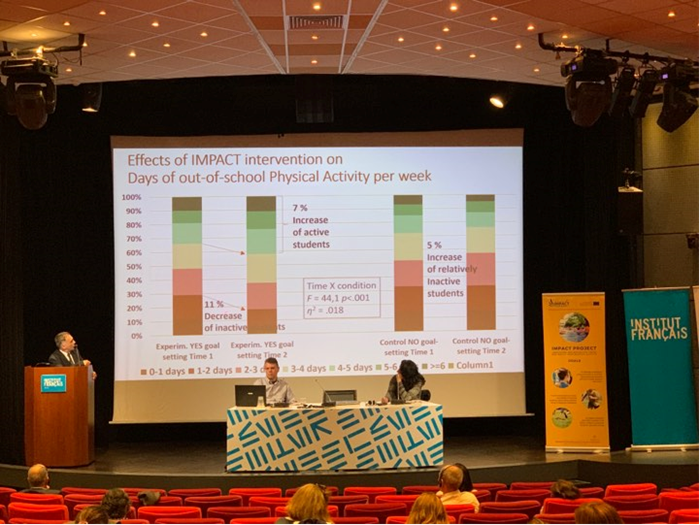
- Primary school pupils were more physically active compared to secondary and high school pupils.
- Primary school pupils reported higher scores in perceived mastery climate, intrinsic motivation, task orientation and well-being variables compared to secondary and high school pupils.
- As pupils move from Primary to Secondary and High School the Basic Need Satisfaction seems to go down.
- Experimental group pupils (their PE teachers trained through 5 to 6 online webinars) increased their out-of-school physical activity levels compared to control group pupils (their PE teachers did not receive any training) in the 4 European countries (FR, IT, GR, TR).
- PE teachers are a key element to guarantee the active lifestyle of the next generation and need innovative and motivationally-based education to create gender and age-sensitive empowering climates.
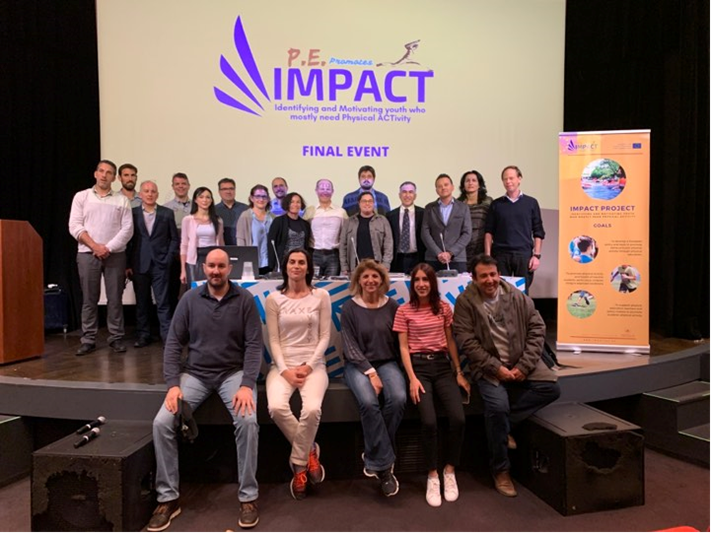
Based on the above IMPACT project results, the following recommendations were made to policy makers and the European Commission:
- Increase hours of Physical Education in schools across all Europe.
- Open schools in afternoons & weekends for extra-curricular physical activity.
- Invest more in teacher’s in-service training – Use IMPACT project webinars & tools.
- Make the IMPACT project educational material more specific across different grades – developmentally based.
- Increase the number of specific tasks and pupils’ “projects” aimed at physical activity promotion.
- Increase the number of specific tasks and pupils’ “projects” aimed at collaboration and mutual support between schoolmates in order to promote physical activity.
- Better pre-service teacher education programs (i.e., universities) focused on extra-curricular physical activity.
- Students’ internships to focus on out-of-school Physical Activity.
- Core role of educating students to promote out-of-school PA (look out of the window)
- Inform parents.
- Train parents.
- Use the IMPACT website for in-service and pre-service training for physical activity promotion.
- Use the IMPACT project measures of Physical Activity and motivation in Physical Education.
- Connect IMPACT Climate measures/scales for training of teachers, university students and parents, to facilitate their understanding of theory of motivation and its application in school physical education.
- Use short IMPACT-project measures (3 minutes to complete) of physical activity, self-monitoring and goal-setting to promote pupils’ physical activity.
- Use other motivational measures (e.g., enjoyment in physical education) with pupils to understand how their progress and collaboration with others make them happy.
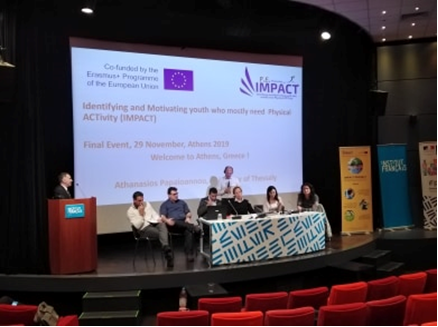
The coordination of the project at a European level had Professor Papaioannou Athanasios (Program Manager) and a team of researchers and academic staff of the Department of Physical Education & Sport Science, University of Thessaly had collaboration with executives and researchers from another 12 bodies for the implementation of the program. Financing was undertaken directly by the European Commission, after successful submission of a competitive proposal of the Department of Physical Education & Sport Science, University of Thessaly under the European ERASMUS + SPORT program, which is considered one of the highly competitive programs for financing. The IMPACT is one of the few European projects with content to promote physical activity through Physical Education.
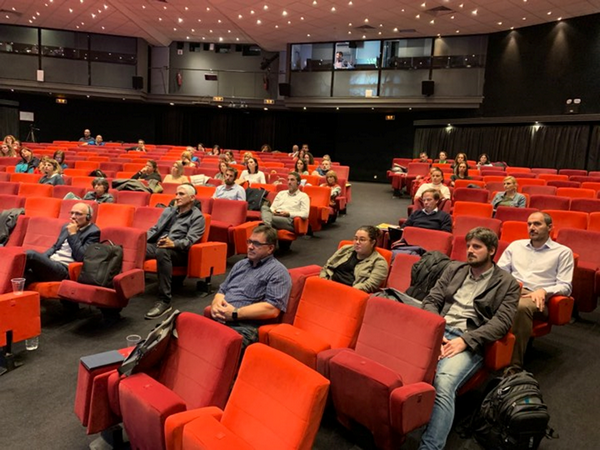
Presentations
Participants:
University of Thessaly
Greek Ministry of Education
Greek Institute of Educational Policy
Ankara Ministry of Education
Hacettepe University
Grenoble-Alpes University
University of Padova
CAPDI-LSM (Italian Association of Physical Education Teachers)
Autonomous University of Barcelona
University of Birmingham
EUPEA (European Physical Education Association)
DSLV (German Association of Physical Education Teachers)
IMPACT e-mail: This email address is being protected from spambots. You need JavaScript enabled to view it.
IMPACT website: www.impactpe.eu
